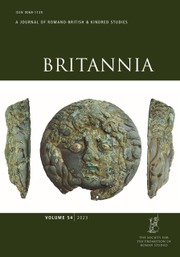Crossref Citations
This article has been cited by the following publications. This list is generated based on data provided by Crossref.
Keppie, Lawrence
2018.
Inscribed and sculptured stones seen at the Roman fort of Auchendavy on the Antonine Wall in 1825.
Scottish Archaeological Journal,
Vol. 40,
Issue. 1,
p.
101.
Tomlin, R.S.O.
2024.
III. INSCRIPTIONS.
Britannia,
p.
1.


